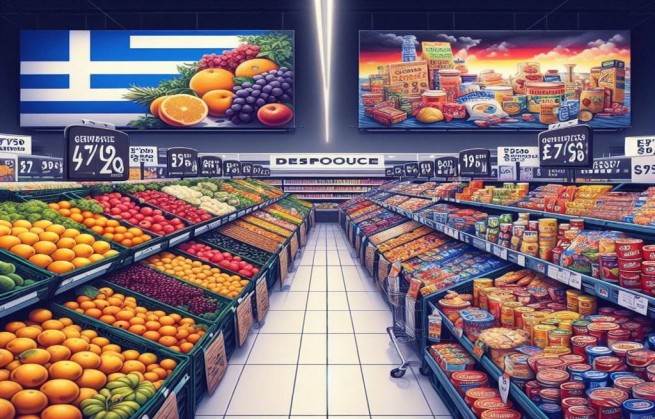At a time when the growing rate of total inflation and rising food prices are “suffocating” the population of Greece, in Germany, on the contrary, everything is just fine.
Comparing Greek food prices with their counterparts in German supermarkets is especially revealing when you consider the wage gap that separates the two countries. This conclusion follows from a corresponding study conducted OPENWhereby prices on German supermarket shelves are lower than in Greece, where the minimum wage is 780 euros per month.
According to the study, halva from the same company and in the same quantity is sold in Greece for 6.54 euros, and in Germany for only 4.60 euros. Accordingly, the same package of 1 kg of yogurt costs 4.38 euros in Greece, and only 3.99 euros in Germany. 500 g of white rice in Greece sells for 2.06 euros, and in Germany for only 1.80 euros. Beans (of the same brand and quantity) are sold in Greece for 2.53 euros, while in Germany the price does not exceed 2.49 euros.
“Such large differences are not justified”
“Some companies offer good purchasing prices, but of course such large differences in the cost of products are not justified,” commented Mr. Sotiris Poulos, owner of a supermarket selling Greek products in Frankfurt. As Mr. Poulos explains, “The average salary here is about 1800, maybe 2000 or even 2200, and I’m talking about the net amount that the employee gets his hands on.”
How is this possible?
According to experts, only few companies control the supply of products. Professor of Finance at the University of Piraeus Michalis Glezakos emphasizes that “the ability of multinational corporations to undersell in Greece is due to the lack of significant free competition.” This happens because in In most sectors, the Greek market is controlled by several companies, control mechanisms are ineffective“







More Stories
How much does a square meter of housing cost in the Cyclades
Electricity: subsidy only for 500 kilowatt-hours, 80% for each additional kilowatt-hour
Construction Materials Prices Increased by 5.4% in June